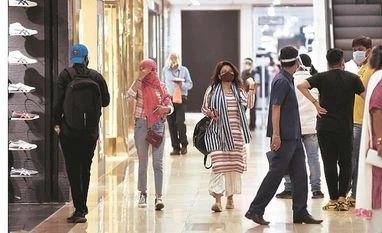Consumers show intent to up spending in festive season, says report
Indian consumers have shown an intent to increase discretionary spends in anticipation of the upcoming festive season
)
Indian consumers have shown an intent to increase discretionary spends in anticipation of the upcoming festive season but a majority of them are still concerned about their physical wellbeing and health of their family members, according to a report by Deloitte.
In its latest 30-day analysis of 'Global State of the Consumer Tracker' conducted in June, Deloitte Touche Tohmatsu India LLP (DTTILLP) said there was a decline in the overall anxiety levels to 39 per cent from 45 per cent in the previous study done in May, as the number of new COVID-19 cases across the country continues to decrease.
"Indian consumers have shown an intent to increase discretionary spends in anticipation of the upcoming festivities like Eid, Raksha Bandhan, Janmashtami, and Ganesh Chaturthi. Across age groups, there continues to be a preference to spend more on convenience," the company said.
The signs of reduced anxiety are also linked to the increase in the nationwide vaccination coverage.
As per its study, Deloitte said 87 per cent consumers are willing to spend more as they prioritise convenience over price, 61 per cent indicated that they now feel safe visiting the stores to shop, while 51 per cent have shown willingness to attend in-person events.
Also Read
However, 79 per cent of Indian consumers were concerned about their physical wellbeing and 85 per cent about the health of their family, it added.
Young adults at 47 per cent are saving more as compared with people above 55 years of age at 43 per cent, the survey said. It added, "While corporate India is still evaluating return to work policy, work-from-home has helped staff save significantly on transport and rent."
Commenting on the findings, DTTILLP Partner and Consumer Industry leader Porus Doctor said, "Our latest survey insights indicate that the Indian consumer is showing signs of reduced anxiety and is open to looking at increasing discretionary spends."
Only 20 per cent of Indian consumers are concerned about returning to their workplace but 65 per cent are concerned about losing their jobs, he added.
Stating that travel sentiments are also showing positive trends, Doctor said consumers in the age group above 35 years have shown interest to travel for leisure in the next three months and 58 per cent of consumers have indicated they are comfortable staying at a hotel.
The survey also found that consumers are declining use of public transport and spending cautiously on the next vehicle is a constant trend.
As many as 79 per cent of Indian consumers intend to keep their current vehicles for a longer time, while 76 per cent, compared with 79 per cent in the previous wave, are concerned about using public transport.
Deloitte's Global State of the Consumer Tracker survey was conducted online in 18 countries targeting 1,000 people over 18 years per country.
The countries in focus are India, Chile, China, Mexico, Australia, the United Kingdom, the United States, Ireland, South Korea, South Africa, Canada, Japan, France, Poland, Spain, the Netherlands, Germany, and Italy.
(Only the headline and picture of this report may have been reworked by the Business Standard staff; the rest of the content is auto-generated from a syndicated feed.)
More From This Section
Don't miss the most important news and views of the day. Get them on our Telegram channel
First Published: Jul 23 2021 | 5:19 PM IST
